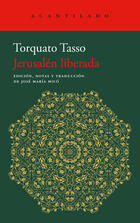With Jerusalem liberated, Torquato Tasso set out to write an epic poem on par with the Iliad and the Aeneid, not inspired by mythology, but by a historical fact: the Christian conquest of Jerusalem during the First Crusade. The siege of the city provided the framework for the restoration of classical epic poetry, but poetic imagination infused it with pathos, for Tasso never relinquished his desire to astonish the reader or his conviction that verse was the means to achieve it. Blending truth and fiction, weapons and love, fable and tragedy, he created a sublime, reflective, and melancholic moral epic, and not only sang the praises of the victors, but also placed poetry at the service of the vanquished. Published in 1581, the work soon became one of the most widely read and appreciated in Europe, inspiring generations of painters, musicians and writers: from Tintoretto to Delacroix, f...read more
All book titles by this author
|
Title |
Price | ||
|---|---|---|---|
|
|
Jerusalén liberada Author: Torquato Tasso Publisher: Acantilado Collection: Acantilado: El Acantilado |
$1,595.00
25%$1,196.25 |
Shopping cart
Loading cart
Important notices
|
|
Recordando a André Rouillé: Su legado en la fotografía André Rouillé 1948 - 2025 |
|
|
Libros de filosofía y co. Disponibles en Librería Herder |
|
|
Revista Filosofía & Co. nº 9 Nueva revista de filosofia divulgativa y actualidad |
|
|
"Espacios de la filosofía" - Mauricio Beuchot - Novedad Herder México |
|
|
Revista Filosofía & Co. nº 8 Nueva revista de filosofia divulgativa y actualidad |
Pay safely with:


In the webshop
New
|
|
Al son de la utopía 70446 $620.00 -25.00% $465.00 |
|
|
Tú pones la tormenta y yo la noche 70461 $595.00 -25.00% $446.25 |
|
|
Genocidios 70465 $570.00 -25.00% $427.50 |
|
|
Los tres cuerpos 70427 $360.00 -10.00% $324.00 |
|
|
Contra el Arte 70458 $610.00 -25.00% $457.50 |
In the press
Promotions
|
|
Lingüística española aplicada a la terapia del lenguaje 70239 $300.00 -25.00% $225.00 |
|
|
Introducción a la filosofía 70243 $620.00 -25.00% $465.00 |
|
|
El tratamiento de los niños autistas 70240 $675.00 -25.00% $506.25 |
|
|
Historia del arte I 70244 $1,545.00 -25.00% $1,158.75 |
|
|
Diccionario de términos filológicos 70241 $900.00 -25.00% $675.00 |










